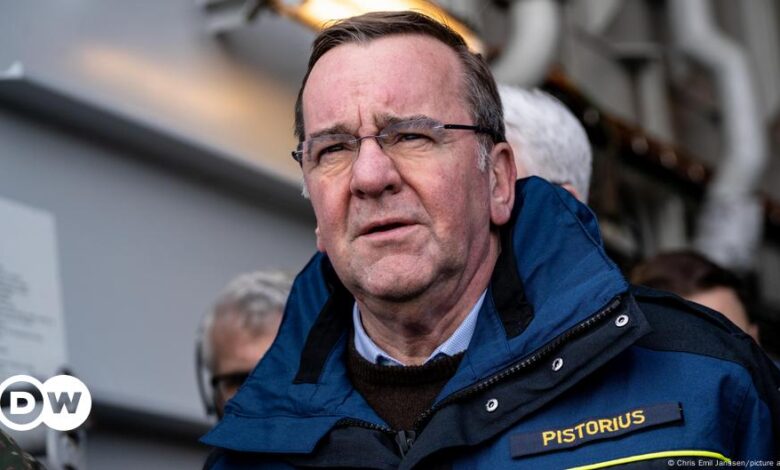German defense minister warns of Russian ‘hybrid warfare’ – DW – 12/22/2024

German Defence Minister Boris Pistorius warned Sunday that Berlin must be ready to respond to any hybrid attacks from Russia in the run-up to snap federal elections and beyond.
A hybrid attack is a comprehensive cyber assault that uses multiple methods to infiltrate and compromise a target’s IT systems, networks, or devices.
Pistorius’ comments follow a warning by German spy chiefs over an increased Kremlin threat in October.
What did Pistorius say?
“[Russian President Vladimir] Putin is engaging in hybrid attacks, and Germany is particularly in focus,” Pistorius told the Funke Mediengruppe newspaper group.
“He knows us well, Putin knows how to make pinpricks in us,” the defense minister added. “Ignoring this threat because it makes us uncomfortable will not make it smaller but rather larger.”
Pistorious cited recent incidents targeting Germany’s infrastructure and energy supply, including activities blamed on Russia in the North and Baltic Seas.
He said the threat may come from disinformation on social media, designed by Kremlin-back actors to divide German society, which could help the far-right and populist parties.
“There are also campaigns on social media, interference in election campaigns, and the financing of voices, such as [the far-right Alternative for Germany] AfD and [the populist Sahra Wagenknecht Alliance] BSW, claiming that we are not concerned with our own protection, but are heading for a war with Russia.”
“We must do everything we can to prevent Putin’s strategy from succeeding,” Pistorius added.
Russia’s military spending a threat to NATO
While there is no imminent military threat from Moscow, the defense minister warned that Putin could have rearmed his country by 2030, giving it the ability to attack NATO members.
“We must also expect that in the next few years, Putin could test how united NATO really is by making an advance in one place or another of the alliance’s territory,” Pistorius told the newspaper group.
Since launching his full-scale invasion of Ukraine in February 20222, Putin has turned Russia into a war economy, producing more weapons and ammunition in months than all European Union states in a single year, the minister added.
German Chancellor Olaf Scholz’s government also ramped up military spending after the invasion, bringing Berlin’s defense spending into line with NATO targets for the first time in decades.
When asked whether Germany is where it needs to be militarily, Pistorius said, “We are on a good path.”
This year alone, he noted, 97 major projects worth €58 billion ($60.5 billion) have been launched, surpassing last year’s record. But he added that it would take more than one legislative period to close the gap on 30 years of underfunding.
On Wednesday, the German Navy got key approval to expand its fleet with an order for four more advanced submarines, in a deal with ThyssenKrupp Marine Systems (TKMS) costing about €4.7 billion.
Also this week, Pistorius said Berlin plans to increase the size of its armed forces to 230,000, up from the current target of 203,000.
However, the minister told Funke newspapers that Germany’s defense sector “needs time to ramp up production capacities to produce weapons and ammunition,” as the production of tanks, frigates and submarines can take several years.
Pistorius ranks highest in public support
Separately, a poll for Bild am Sonntag newspaper placed Pistorius up top in an annual ranking of German politicians.
Around 46% of those surveyed by Insa said they thought the defense minister should have as much influence as possible in German politics next year.
Bavaria’s conservative state Premier Markus Söder (CSU) scored 38% on the same question, while Scholz was beaten into sixth place with 28% support.
Scholz came in behind BSW chief Wagenknecht, center-right CDU leader Friedrich Merz and AfD co-chair Alice Weidel.
mm/sms (dpa, Reuters)




